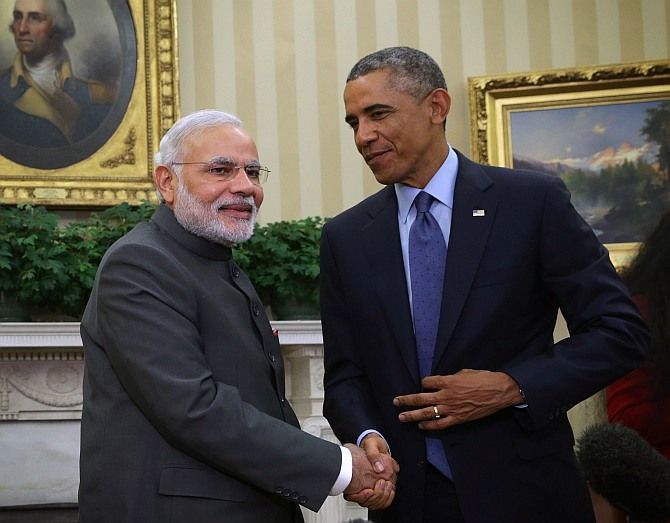
Prime Minister Narendra Modi’s United States visit next week at the invitation of President Barack Obama is about ‘consolidation’ and ‘celebration’ of bilateral ties, India’s envoy to the US has said.
"The invitation and the visit is part of consolidating and celebrating the relationship," Ambassador of India to the US Arun K Singh told a group of Indian reporters on Wednesday ahead of Modi's visit to the White House next week.
Modi is scheduled to arrive at the Joint Air Force Base Andrews on June 6 and is expected to spend a little over 50 hours in the American Capital. While his schedule is still being given final shape by officials in Washington, DC, he is likely to lay wreath at the Tomb of Unknown Soldier at Arlington National Cemetery the afternoon of his arrival.
The prime minister is likely to stay at Blair House, the personal guest house of the US President on Pennsylvania Avenue across the White House.
Leaders of the two largest democracies of the world are scheduled to meet at the White House on June 7, which would include meetings at the delegation level and one-o-meeting, following which the two are likely to address mediapersons.
Thereafter, Obama would host lunch for Modi. Later in the evening, Modi would interact with a select group of top American corporate leaders including Amazon Chief Executive Officer Jeff Bezos and address the annual gala of US India Business Council as part of his relentless effort to attract foreign direct investment in India.
"Another important dimension of his visit would be his address to the joint session of the Congress (on June 8)," the Indian ambassador said.
Modi is expected to spend some four hours at the Hill attending four back to back meetings. He would be received by House Speaker Paul Ryan, who decided to invite Modi for his first joint address to the Congress. Ryan would also host a lunch for him. Thereafter, Modi would attend a rare reception hosted in his honour by the Senate and House foreign relations committees and the India Caucuses in the House and the Senate.
Some 400 people are likely to attend this reception.
"It is a reflection of the bipartisan support in the US to the relationship with India. It is also a reflection of the value people attach to this relationship," Singh said.
Describing the visit as consolidation and celebration of relationship, Singh said ‘consolidating what has been achieved so far and seeing what more can be done as we move into next year’ when there would be transition of administration in the US and to celebrate the achievements in the relationship.
In a sense the new phase in Indo-US relationship started from 2000 with visit of the then President Bill Clinton to India. This was further consolidated by George Bush and Obama’s visit to India twice. Obama has described India-US relationship as the defining partnership of the 21st century, Singh said.
"His articulation of support for our permanent membership to the United Nations Security Council, US support to India's membership to the multilateral export control regimes, the advances we have made in defence partnership -- including through the defence trade and technology initiative where among the projects we are now looking at our projects related to aircraft career technology and jet engine technology," Singh said.
"So a lot of progress has been made in the two terms of President Obama. And then to celebrate that, see where we are and then launch it into the new administration. That has been the thrust and effort related to this visit," he said.
The US has repeatedly articulated that India is the net provider of security in that region, Singh said.
"The US sees India as not adversarial but as a very useful partner. So the visit is a reflection of that," he said.
Ahead of the visit, the two countries are likely to sign a series of agreements this week and early next week both in Washington and New Delhi. Some of them related to wildlife trafficking, global entry program.
Intense discussions are currently underway between Westinghouse and Nuclear Power Corporation of India Limited to arrive at some kind of agreement before or during Modi’s trip. The discussions are mostly believed to be in the domain of cost and financing.
With defence and security being one of the key issues of discussions, Defence Secretary Ashton Carter would call on him. Secretary of State John Kerry would be away in Beijing attending the US-China Strategic and Economic Dialogue.
During his visit, Modi is expected to participate in a ceremony for repatriation of 16 historic stolen items to India.











 © 2025
© 2025